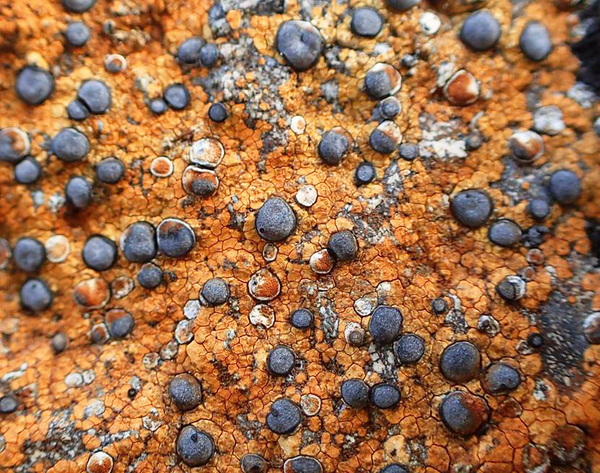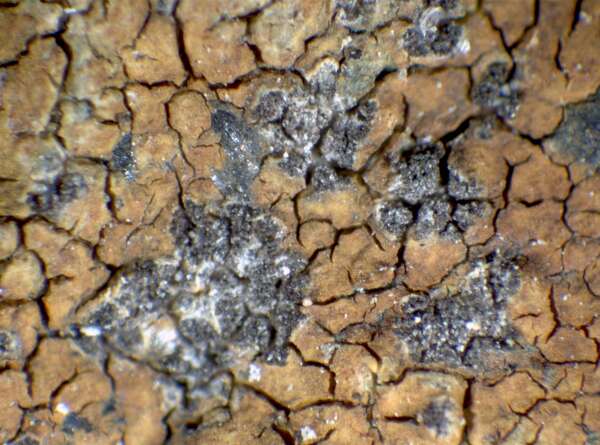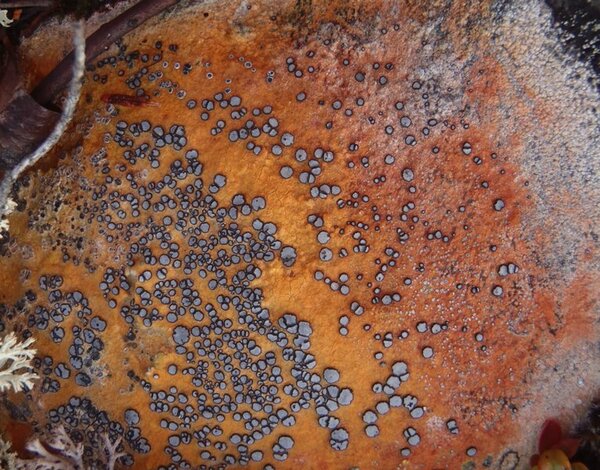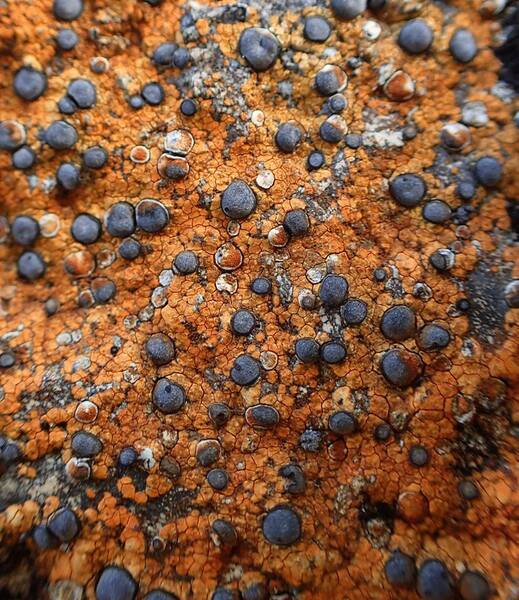Porpidia flavicunda (Ach.) Gowan
Bryologist, 92: 43, 1989. Basionym: Lecidea flavicunda Ach. - Lichenogr. Univ.: 166, 1810.
Synonyms: Biatora flavocoerulescens (Hornem.) Hepp; Haplocarpon flavocaerulescens (Hornem.) V. Wirth ex Hertel; Huilia flavicunda (Ach.) Mas. Inoue; Huilia flavocaerulescens (Hornem.) Hertel; Lecidea contigua var. flavicunda (Ach.) Nyl.; Lecidea flavocaerulescens Hornem.; Porpidia flavocaerulescens (Hornem.) Hertel & A.J. Schwab
Description: Thallus crustose, episubstratic, orange to orange-yellow, sometimes with white or grey patches, smooth to rimose-areolate, delimited by a black prothallus. Medulla white, I-. Apothecia lecideine, black, at first semi-immersed, then sessile with a slightly constricted base, (0.2-)1-2(-4) mm across, with a mostly flat, finally convex, thinly to heavily pruinose, sometimes subgyrose or umbonate disc and a thick, raised, smooth to crenulate, often finally flexuous proper margin. Proper exciple of conglutinated, branched, (2-)3-4 μm thick hyphae radiating from the hypothecium, dark in outer part, much paler within, K-; epithecium olive-brown, granulose; hymenium colourless, 75-120(-140) μm high; paraphyses coherent, branched and anastomosing, slightly swollen at tips; hypothecium colourless or pale yellow-brown in upper part, dark brown in lower part. Asci 8-spored, elongate-clavate, with a thin, outer amyloid layer and a thickened tholus penetrated by a pore, the sides of which are strongly amyloid, Porpidia-type. Ascospores 1-celled, hyaline, ellipsoid, 14-19(-24) x (6-)8-11 μm, with a thin perispore. Photobiont chlorococcoid. Spot tests: cortex K-, C-, KC-, P-, UV-; medulla K/UV+ mauve. Chemistry: thallus with confluentic acid (other chemotypes known from N America).
Growth form: Crustose
Substrata: rocks
Photobiont: green algae other than Trentepohlia
Commonnes-rarity: (info)
Alpine belt: extremely rare
Subalpine belt: very rare
Montane belt: extremely rare
Dry submediterranean belt: absent
Humid submediterranean belt: absent
Padanian area: absent
pH of the substrata:
1 2 3 4 5
Solar irradiation:
1 2 3 4 5
Aridity:
1 2 3 4 5
Eutrophication:
1 2 3 4 5
Poleotolerance:
0 1 2 3
Altitudinal distribution:
1 2 3 4 5 6
Rarity
absent
extremely rare
very rare
rare
rather rare
rather common
common
very common
extremely common
Loading data...
Occurrence data
Predictive map
Growth form: Crustose
Substrata: rocks
Photobiont: green algae other than Trentepohlia
Commonnes-rarity: (info)
Alpine belt: extremely rare
Subalpine belt: very rare
Montane belt: extremely rare
Dry submediterranean belt: absent
Humid submediterranean belt: absent
Padanian area: absent
pH of the substrata:
| 1 | 2 | 3 | 4 | 5 |
Solar irradiation:
| 1 | 2 | 3 | 4 | 5 |
Aridity:
| 1 | 2 | 3 | 4 | 5 |
Eutrophication:
| 1 | 2 | 3 | 4 | 5 |
Poleotolerance:
| 0 | 1 | 2 | 3 |
Altitudinal distribution:
| 1 | 2 | 3 | 4 | 5 | 6 |
Rarity
absent
extremely rare
very rare
rare
rather rare
rather common
common
very common
extremely common
Loading data...
Occurrence data
Predictive map










